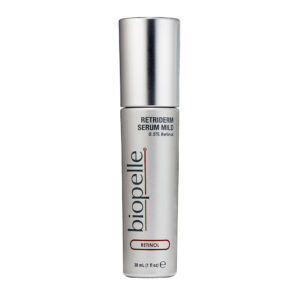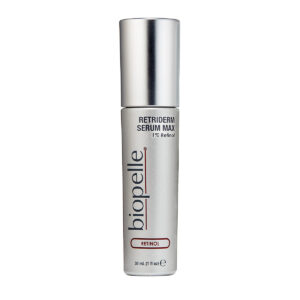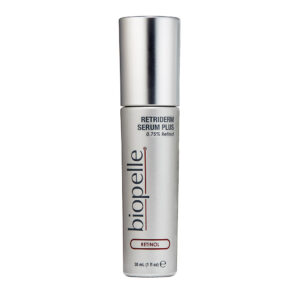Retinol—a derivative of vitamin A—is one of the top-recommended ingredients for anti-aging because it can do so much. This superstar ingredient can help reduce the appearance of wrinkles and fine lines, brighten dull skin, increase cellular turnover, reduce acne and fade dark spots. It also helps prevent signs of aging. Murad Alam, a dermatologist in Chicago and president of the American Society for Dermatologic Surgery, told the New York Times in 2019 that it was “the best-studied and most-evidence-backed topical medication for reducing the visible signs of aging due to sun exposure.”
But with the rise in popularity of retinol for all age groups, it’s important to know how to effectively use these products. Today, we’re focusing on the fact that retinol and sun exposure don’t play well together.

A Quick Retinol Refresher
Retinol is a kind of catch-all phrase applied to topical applications of retinoids—derivatives of vitamin A that work by supporting collagen production and cellular turnover.
You may see retinol under the name:
- Retinol
- Retinyl palmitate
- Tretinoin
- Tazarotene
- Adapelene
- Hydroxypinacolone Retinoate (HPR)
Some of these retinoids can be found over the counter, like adapelene, retinol and retinyl palmitate.
Is Retinol and Sun Sensitivity a Myth?
You may notice that most retinol products are recommended for PM use. Even more warn that retinol can cause irritation, dryness, flaking and redness. New retinol users may worry that the two warnings interact with each other, but dermatologists say that’s not entirely true.
The main reason retinol is recommended for nighttime use, according to Robert Anolik, a dermatologist in Manhattan and a clinical assistant professor at the NYU School of Medicine, is that ultraviolet light (like from the sun) can make retinoids less effective. By applying your retinol before heading out for the day, you’ll get fewer benefits. But that’s not all of it. Because retinol promotes cellular turnover, new skin cells can be more susceptible to UV damage.
Adam Friedman, MD, FAAD—a board-certified dermatologist and professor at the George Washington University School of Medicine and Health Sciences in New York—told Byrdie that “Retinol itself is not sun sensitizing. Just take the proper sun-protective precautions, such as using sunscreen daily, on affected areas.”
So while technically the idea that retinol will combust if you apply it in the morning and leave the house is, indeed, a myth, it’s still incredibly important to take proper precautions. Make sure to apply a sunscreen of at least SPF 30 before going outside, especially if you apply retinol in the morning.
Sunscreen Best Practices
- Everyone needs sunscreen. It doesn’t matter your skin tone, age or gender.
- Sunscreen is never optional—even if it’s cloudy or you’re inside all day.
- The best sunscreen is water resistant, broad spectrum and SPF 30 or higher.
- Use enough sunscreen. Most doctors recommend 1 ounce—about the size of a shot glass—for the whole body. Most people use about 20%-50% of the amount of sunscreen needed to achieve the level of SPF on the label.
- Reapply often—dermatologists recommend a full reapplication every two hours.
Use the Best Retinol for You
Everyone will react to retinoids differently, which is why it’s recommended you start slowly and gauge how well your skin adapts and builds tolerance. Often when introducing a new retinoid, it’s best to start every other day, at most, and increase the frequency of application as your skin adjusts.
Biopelle’s Retriderm collection comes in three strengths:
Retriderm combines retinol in a water-based suspension, vitamin E and humectants like hyaluronic acid, glycerin and solubilized collagen to help maintain hydration and limit irritation. The collection also features Linseed oil, which helps seal in moisture.



